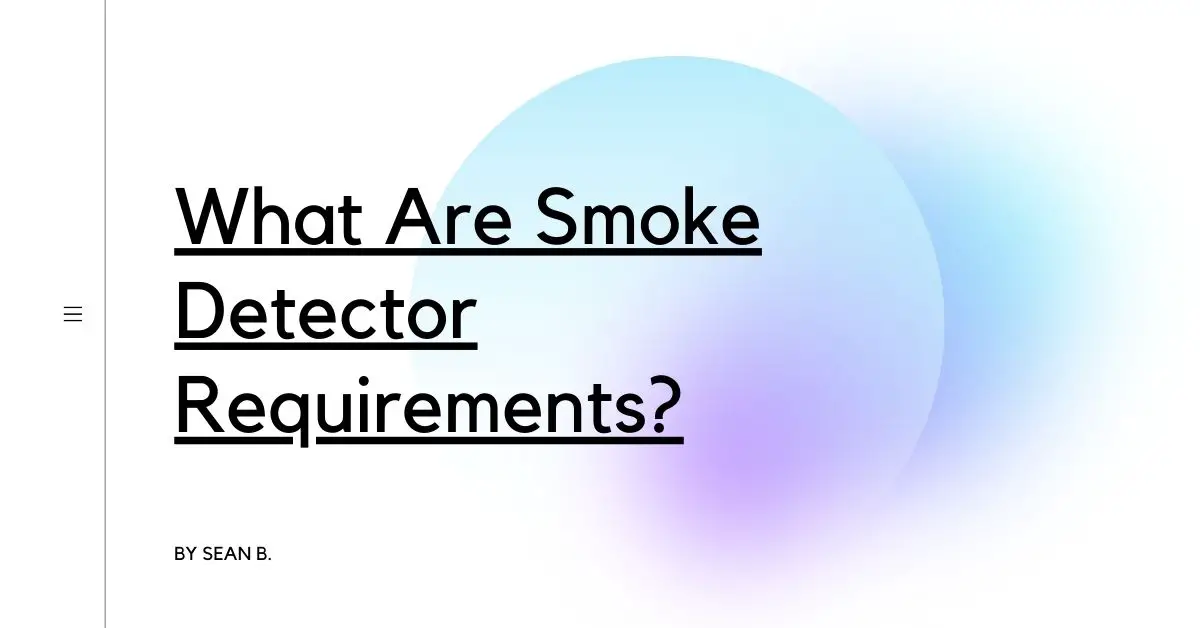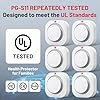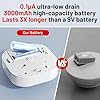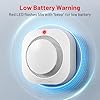Smoke detectors are devices that alert people to the presence of smoke in an area. Most smoke detectors are designed to detect the presence of smoke particles in the air. Smoke detectors can be either battery-operated or electrically powered. Smoke detectors are required in most public buildings, such as schools and office buildings, as well as in private residences.
Contents
Smoke Detector Regulations by State
Smoke detectors are an important part of any home or business fire safety plan. They provide early warning of a fire, giving people time to escape. While most states have adopted laws requiring the installation of smoke detectors in homes and businesses, there can be variations in the regulations.
For example, some states require that detectors be hard-wired into the electrical system, while others allow battery-operated detectors. There can also be differences in the type of detector required. Some states require ionization detectors, while others allow either ionization or photoelectric detectors.
It’s important to be aware of the smoke detector regulations in your state, as well as any local ordinances that might apply. Failure to comply with the law can result in fines or other penalties. If you’re unsure of the requirements, check with your local fire department or building code enforcement office.
Smoke Detector Requirements for Businesses
Smoke detectors are an important part of any business fire safety plan. They provide an early warning of a fire, allowing occupants to evacuate the building before the fire spreads.
There are different types of smoke detectors available, each with its own advantages and disadvantages. The most common type of smoke detector is the ionization smoke detector. This type of detector uses a small amount of radioactive material to ionize the air in the sensing chamber. When smoke particles enter the chamber, they disrupt the ionization, causing the detector to sound an alarm.
Ionization smoke detectors are very sensitive and can detect even the smallest amounts of smoke. However, they are also susceptible to false alarms, particularly from cooking smoke or steam. Another type of smoke detector is the photoelectric smoke detector. This type of detector uses a light-sensitive sensor to detect smoke particles in the air.
Photoelectric smoke detectors are less likely to cause false alarms than ionization detectors, but they are not as sensitive to small amounts of smoke. Both types of detectors are available in battery-operated or hardwired versions.
Most businesses are required to have smoke detectors installed in accordance with the fire code. The specific requirements vary from one jurisdiction to another, but typically all businesses must have at least one smoke detector per floor. Some jurisdictions also require smoke detectors in common areas, such as hallways and stairwells.
Smoke detectors must be regularly tested and maintained to ensure that they are working properly. Battery-operated detectors should be tested monthly and the batteries should be replaced annually. Hardwired detectors should be tested monthly and the wiring should be inspected annually.
Smoke Detector Requirements in Rental Properties
Smoke detectors are an important part of any rental property. They provide early warning of a fire, and can help to save lives and property.
There are several different types of smoke detectors available on the market, and each has its own advantages and disadvantages. The type of smoke detector that is best for your rental property will depend on a number of factors, including the size and layout of the property, the number of occupants, and the risk of fire.
Hard-wired smoke detectors are usually the best option for rental properties. They are more reliable than battery-powered detectors, and they can be interconnected so that all units sound an alarm if one unit detects smoke.
Wireless smoke detectors are another option for rental properties. These units are easier to install than hard-wired detectors, and they can be placed in areas where hard-wired units would be difficult to install. However, wireless detectors are more expensive than hard-wired units, and they may not be as reliable.
The best way to determine the type of smoke detector that is best for your rental property is to consult with a professional. A qualified fire safety consultant can assess the risk of fire in your property and recommend the best type of smoke detector for your needs.
Smoke Detector Requirements for New Construction
When it comes to protecting your home from fire, smoke detectors are an absolute must. In fact, most building codes now require that all new construction homes be equipped with smoke detectors. But what are the specific requirements for smoke detectors in new construction homes?
First, let’s start with where smoke detectors must be installed. Generally speaking, smoke detectors should be installed on every level of the home, including the basement. They should also be installed in every sleeping area, and outside of each bedroom door. In addition, smoke detectors should be installed in the living room, family room, and any other common areas.
As for the type of smoke detectors required, most building codes now call for “ionization” smoke detectors. These are the most effective at detecting fast-moving fires, which tend to be the most dangerous. However, some codes also allow for “photoelectric” smoke detectors. These are better at detecting smoldering fires, which can sometimes give you more time to escape.
Finally, most codes also require that smoke detectors be hard-wired into the home’s electrical system. This is the best way to ensure that they will always have power, even if there’s a power outage. However, some codes do allow for battery-operated smoke detectors. These are a good option if you’re concerned about power outages, but they do require regular battery changes.
Smoke Detector Requirements in Daycare Centers
In the United States, the National Fire Protection Association (NFPA) has released a document detailing the requirements for smoke detectors in daycare centers. This document, NFPA 101, The Life Safety Code, is the primary source of guidance for fire and life safety in daycare centers.
The code requires that all daycare centers have smoke detectors installed in accordance with local building codes. However, there are some additional considerations for daycare centers. First, the code requires that smoke detectors be installed in all sleeping areas, regardless of whether they are required by local building codes. Second, the code requires that smoke detectors be interconnected, so that if one smoke detector is triggered, all of the smoke detectors will sound.
In addition to the requirements for smoke detectors, the code also includes guidance on the use of sprinklers in daycare centers. The code does not require sprinklers in daycare centers, but it does encourage their use. The code requires that, if sprinklers are installed, they must be in accordance with NFPA 13, Standard for the Installation of Sprinkler Systems.
The NFPA 101 code is the primary source of guidance for fire and life safety in daycare centers. However, local building codes may have additional or more stringent requirements. Daycare centers should consult with their local code officials to determine the applicable requirements.
Smoke Detector Requirements for Senior Living Facilities
As people age, they are more susceptible to fires. In fact, people over the age of 65 are twice as likely to die in a fire than the general population, according to the National Fire Protection Association. That’s why it’s so important for senior living facilities to have working smoke detectors.
There are two types of smoke detectors: ionization and photoelectric. Ionization detectors are better at detecting fast flaming fires, while photoelectric detectors are better at detecting smoldering fires. Senior living facilities should have both types of detectors installed.
Smoke detectors should be placed on every level of the facility, including the basement, and in every sleeping area. They should be placed high on walls or ceilings, at least four inches away from corners. And they should be tested monthly to ensure they’re working properly.
In addition to smoke detectors, senior living facilities should also have a fire sprinkler system. This system is designed to automatically detect and extinguish fires, and can help prevent fires from spreading.
Senior living facilities have a responsibility to keep their residents safe. That includes making sure there are working smoke detectors throughout the facility.
Smoke Detector Requirements for Hotels
In the United States, hotels are required to have smoke detectors in all guest rooms and common areas. The smoke detectors must be installed in accordance with the National Fire Protection Association’s (NFPA) standards.
Smoke detectors play a critical role in fire safety. They are designed to detect smoke and sound an alarm to alert occupants of a fire. Smoke detectors can be either battery-operated or hardwired into the electrical system.
Hotels must install smoke detectors in all guest rooms and common areas in accordance with NFPA standards. The smoke detectors must be interconnected so that if one smoke detector sounds an alarm, all smoke detectors will sound an alarm.
Smoke detectors must be tested monthly and the batteries must be replaced regularly. If a smoke detector is not working properly, it should be replaced immediately.
Fire safety is a top priority for hotels. By following the NFPA standards for smoke detector installation and maintenance, hotels can help ensure the safety of their guests and employees.
Summary
Most states have adopted the International Residential Code (IRC) when it comes to residential building codes. The IRC is a model code produced by the International Code Council. It is not a law, but many states have chosen to adopt it as their own.
The IRC contains a section on smoke detectors, which are required in all new homes. The code requires that smoke detectors be installed in all sleeping areas, on every level of the home, and in all common areas. Smoke detectors must be hard-wired into the electrical system or have a battery backup.
Smoke detectors are an important part of keeping your family safe from fire. Make sure your home is up to code and has working smoke detectors on every level.



















